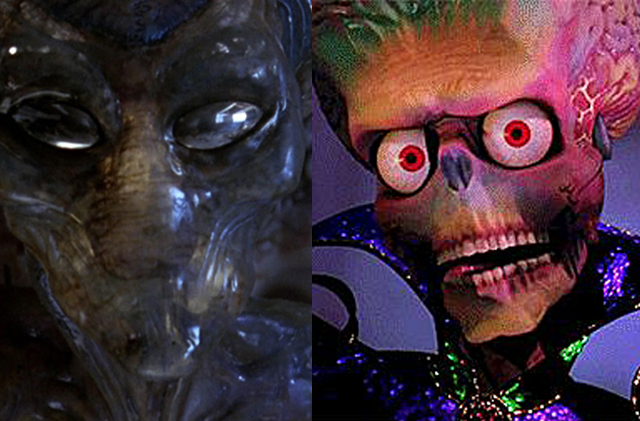
There is often a very fine line between the movies that we are meant to take seriously and those that are meant to be farcical in nature. Sometimes a movie might be so pretentious that it makes us laugh out loud, while other times a comedy’s tone might be set so wrong that it ceases to be funny. If one or the other falls into the opposite effect, it’s usually the sign of a terribly executed film. But, that’s not always the case either. One genre in particular where you see the lines blurred between the profound and the ridiculous is in the realm of sci-fi. Pretty much every film made in this genre requires a level of suspended belief on the part of the viewer, and it’s up to the one telling the story to decide how far they will go. There are many cases in the early days of sci-fi where you couldn’t really tell if the film’s creators were sincere or foolish when they made a genre flick. Many films often felt like they were accidentally hilarious, due to cheap looking effects or awkward performances, or a combination of both. That’s why sci-fi became known as the “B-Movie” genre. Still, there were some sci-fi films that did take the genre more seriously like The Day the Earth Stood Still (1951) and Forbidden Planet (1954), which helped to elevate the genre with a sense of credibility. Since then, the Sci-Fi genre has existed with these two different shades that continues to define it. Most of the time, they are distinct from each other, though there are some films that dare to mix the two together a little. Star Wars, for example, indulges in plenty of campiness, but does so in a completely earnest way allowing us to take it more seriously. Sci-Fi movies that follow the earnest or campy route usually avoid direct comparisons with each other, but sometimes a close release schedule and similar plotting provides an interesting contrast, and shows just how important the differences within the genre really are.
That proved to be the case in the summer of 1996, when we saw the releases of Roland Emmerich’s Independence Day and Tim Burton’s Mars Attacks released just a mere month apart. When you look at them on the surface, it’s hard to see how either of them could be comparable. Roland Emmerich’s film is a mega-budget blockbuster that revolutionized visual effects in Hollywood and wowed audiences with it’s unprecedented sense of scale. Tim Burton’s film is a throwback love letter to B-movies of the 1950’s; intentionally cartoonish and lavished with plenty retro nostalgia and flavor. One movie takes itself seriously, the other does not. And yet, there are some striking connections. Both movies feature an invading alien force, both include the on-screen destruction of landmarks across the world, both center on a beleaguered American president who finds himself increasingly overwhelmed; hell, it even features a crooner in a supporting role (Day’s Harry Conick Jr. and Attack’s Tom Jones). But even apart from the visual and thematic thing that the movies have in common, it’s also interesting to see how they differ in their execution. Independence Day is earnest in it’s depiction of widespread destruction, and plays most of the situation with a sense of dread and suspense. But sometimes the thematic elements are done in such an unsubtle and gun-ho way that it ends up becoming ridiculous by the end. Mars Attacks is a parody all the way through, and never once intends to raise the tension level. But in being so self-conscious about it’s intentions to mock it’s particular genre, does Mars Attacks also spoil the joke in the process and stops being funny? That’s the interesting comparison that comes from analyzing these two sci-fi flicks from the summer of ’96, and by picking through all of their defining features, we can see just how thin that divide in the genre really is.
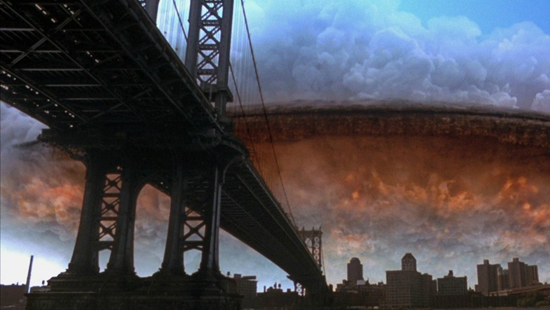
“Hello Boys!!! I’m BAAAAACK!!!”
First of all, let’s look at where the movies differ the most, which is in the visual department. Independence Day came out at a time when CGI technology was just coming into it’s own in Hollywood. Just a few years earlier, Steven Spielberg’s Jurassic Park (1993) brought dinosaurs back to life in a strikingly realistic way. Roland Emmerich and his producer/ co-writer Dean Devlin saw the potential of CGI for a whole different purpose and that was to push the boundaries of scale on the big screen. They took the premise that we’ve seen a million times before in Sci-fi, which is the arrival of aliens riding around in flying saucers, only they did it in a way that we’ve never seen before. Here, the alien saucers were not only bigger, but could cover entire cities; and those were just the small ones. With the tools at their disposal, Devlin and Emmerich revolutionized the genre and showed that this silly, old premise could still present a sense of awe on the big screen. The sequence where the saucers make their first landfall, coming out of the clouds and descending over New York, Los Angeles, and Washington D.C. is still a chill-inducing moment of cinema. Mars Attacks, by contrast, feels pretty quaint, but that’s not it’s fault at all. Tim Burton made it intentionally feel dated, because he wanted to invoke the memory of of the B-movie sci-fi flicks, with all the kitsch that they were famous for. All in all, Attacks is lovingly designed and appealingly retro. However, unlike Day, it has the disadvantage of feeling inauthentic at times. Burton is trying to give his movie a retro look, but with the modern tools of today, which kind of detaches the illusion just a little bit. It unfortunately feels a little too polished to be a B-movie. Independence Day may not be as imaginative visually, but it at least feels authentic to what it’s supposed to be, which gives it a slight edge in terms of the visuals.
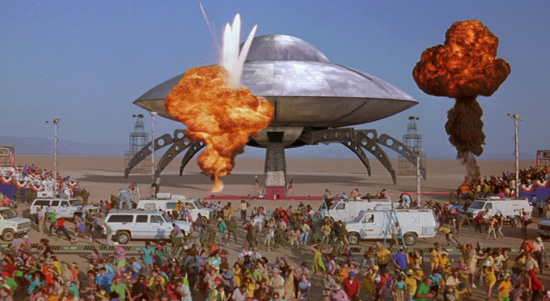
“Don’t run! We are your friends!”
What also sets these two films apart is the cast of characters, or perhaps the way that the films are cast. While Independence Day does feature some star power behind it, with Will Smith in particular being propelled to super stardom by his role, the overall cast is perhaps not used to their best abilities. Some people in the movie do give decent performances (Jeff Goldblum in particular as the nerdy David Levinson), but the rest, I’m sad to say, are reduced to playing what are essentially a collection of stereotypes. This is actually a problem with a lot of Emmerich movies, where he puts so little effort into creating unique individuality for his characters and instead just ends up defining them by what they are instead of who they are. In some cases, that can unintentionally turn the characters into borderline offensive stereotypes, such as Harvey Fierstein’s effeminate boss to Goldblum’s character, or Judd Hirsch’s irritated old Jewish man. What’s even more insulting is that these are actors who should know better than to play up the stereotypes of the communities that they represent. Mars Attacks plays up some stereotypes as well, but they are namely of the types of characters that would’ve inhabited a B-Movie plot back in the 50’s (your military hotheads and damsel in distresses for example). But, what is more impressive with Attacks cast is just how star studded it is. Pretty much anyone that Tim Burton wanted to get is in this movie. Not only does it feature Burton’s former Joker, Jack Nicholson, leading in a dual role as the President and a Casino Owner (probably as a nod to Peter Sellers multiple roles in Dr. Strangelove), but the remaining cast includes heavy hitters like Glenn Close, Pierce Brosnon, Sarah Jessica Parker, Rod Steiger, Martin Short, Jack Black, Natalie Portman, Annette Benning, Michael J. Fox, the afforementioned Tom Jones, and Pam Grier. They even managed to fit in Hall of Famer Jim Brown as well. And all for a throwback to old B-Movie Sci-Fi. Unlike Independence Day, everyone in the film knows to be intentionally silly and not have that be a result of thinly defined characters. They are archetypes as well, but better suited for their particular story.
Unfortunately, as impressive as the cast of Mars Attacks is, the movie doesn’t actually use them as effectively as you would think. What ends up happening is that the movie is too overstuffed with characters, allowing the audience very little time to build a connection to any of them. Nicholson’s President comes the closest to being an identifiable character worthy of investing in, but that’s only because he gets the bulk of the screen-time. We barely get to know any of the other characters, which becomes especially problematic when they start to get picked off one by one by the Martian invaders. There is even a shoehorned in romantic subplot involving Pierce Brosnon and Sarah Jessica Parker’s characters that is so not interesting, because we feel nothing for the characters. I guess it was supposed to be another reference to awkward B-Movie romances, and it is kind of funny that both characters are reduced to disembodied heads by the point that they declare their love for each other, but still it doesn’t work as well as it should. Independence Day by contrast does a better job of endearing it’s characters to the audience. Though the characters are lazily written, Emmerich nevertheless devotes more time for us to get invested in their plight. I think that it helps that he focuses in on three characters in particular; the ones played by Smith, Goldblum, and Bill Pullman as the President. By centering the film on these three, we are able to get both the grand picture of the entire event, but with easily identifiable plot threads that open up a window to these characters’ own experiences. Broad as they may be, they have arcs that pay off in the end. Goldblum’s David gains more courage as he finds purpose in himself once he discovers the aliens’ weak point; Pullman’s President goes from being a timid leader to one that can inspire the whole world to fight back; and Smith’s hotshot pilot finally achieves his dream of reaching outer space. Even Randy Quaid’s redneck pilot character gets an arch, and one that pays off in the most over-the-top way possible. Independence Day may have had the less impressive cast, but it used them much more effectively.
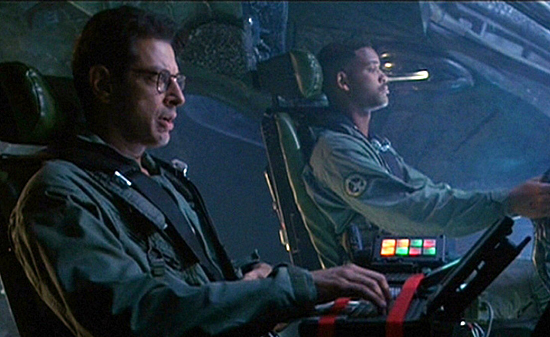
“Forget the fat lady. You’re obsessed with fat lady. Just get us out of here!”
One other big difference between the movies is the aliens themselves. It could be said the the Martians are the real stars of Mars Attacks since they are the focus for most of the plot and are responsible for most of the gags in the movie. Taking inspiration from the card game that the movie was based on, the Martians in Mars Attacks are also visually unique. With the skull like faces and the bulbous, brain protruding heads, they are evocative of B-Movie aliens, but grotesque and off-kilter in a way that makes them unique. Interesting enough, each and every one of them is voiced by the same guy (veteran voice actor Frank Welker) who manages to get so much character out of just repeating the same word over and over again (Ack! Ack! Ack!). More than anything, the Martians represent the more clear input from director Tim Burton, who clearly wanted to indulge in some of the more silly over-the-top campiness of B-Movie era sci-fi. The film itself is intentionally a live action cartoon, and the cartoonish-ly evil Martians fit ever so well into that vision, allowing them to take center stage. The aliens of Independence Day don’t quite get the same kind of love in their movie. In fact, you could say they are the weakest part. The movie eventually does have to show the aliens, but once we see them, the illusion of menace is greatly reduced. We see the creatures as these vacant eyed creatures with translucent skin and giant craniums. In essence, not all that untypical of most other aliens we’ve seen. Once we learn that the aliens are just as fragile as we are, and not much bigger, they become less of a threat more quickly. That’s the unfortunate result that happens in the latter half of the movie. It was far more effective to have the aliens personified through the massive spaceships they pilot. At least those were able to scare us. Overall, the aliens in Mars Attacks works better because they are given the full attention of the story, while it seems that the ones in Independence Day were an afterthought.
The last thing that defines the difference between these two movies, and illustrates that fine line between the serious and the comical in the genre, is the execution of their different styles. It is interesting that Independence Day attempts to make us take it far more seriously, and yet fills it’s run-time with a number of irreverent comical asides that breaks the tension up. Make no mistake, the movie does have moments of sheer terror, especially in the harrowing destruction sequence where we see landmarks like the Empire State Building and the White House blown to bits, but then it’ll be followed with a bit of colorful dialogue from Will Smith or Randy Quaid, deflating the tension immediately. Mars Attacks more or less remains firmly in the realm of comedy, never once crossing into more serious territory. And that is primarily what become the biggest problem with Mars Attacks; that rigid adherence to tone. Comedy, especially with parody, is especially hard to pull off without something there to balance it. Tim Burton keeps things consistently ridiculous, but the tension is lost as we just begin to see the movie as a string of sight gags loosely strung together. The parody only works when the jokes are able to land, and Burton seems to be too preoccupied with everything else to make it all work together. Some sequences are funny, like a montage of the Martians destroying landmarks, with one flying saucer changing the trajectory of the Washington Monument’s fall for maximum civilian casualties. But a lot of other gags fall flat, when they really shouldn’t. Honestly, I get more laughs from Independence Day, just because of how out of place some of the humor is, making it land far better. What Independence Day showed is that it works better in your favor to blur that line between the two styles. Sometimes it makes for a messy, inconsistent tone, but it can be worth it if the result brings a bigger impact. Mars Attacks, with it’s unwillingness to change tone, ends up being a even keel ride around a colorful carousel, while Independence Day with it’s sometimes unpredictable and awkward tone shifts, becomes a wild roller coaster ride that leaves far more of an impression.
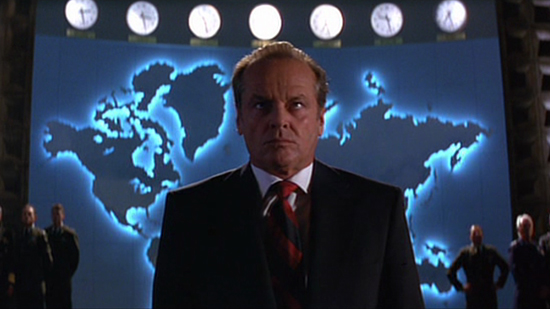
“I want the people to know that they still have 2 out of 3 branches of the government working for them, and that ain’t bad.”
So, there you have the big differences between these similarly plotted, but wildly opposite toned Sci-Fi features. One is an awe-inspiring thrill ride that unfortunately undermines it’s own tension with lazy writing. The other is a well-intentioned and loving parody of old style Sci-Fi, that isn’t quite as funny as it should have been. Both have value, but in the end, I think that the sum of Independence Day’s parts make it the more rewarding experience. It may be wildly inconsistent, and just downright laughably bad in other parts, but you have to admire the boldness that Emmerich and Devlin undertook in order to get it made. In fact, it still stands as career best work for both men, as everything they’ve made since then has failed to connect in the same way. Mars Attacks on the other hand is one of Tim Burton’s more lackluster efforts. The fact that Mars Attacks came right on the heels of Burton’s most critically acclaimed and award-winning film, Ed Wood (1994), probably hurt it’s reputation as well. It’s just too over-stuffed with material that could have produced comedy gold, but just ends up getting drowned out by everything else. Perhaps working with such broad material worked to Burton’s disadvantage, since his strength is more in the visuals of his movie, of which Mars Attacks still benefits from. But, it’s narrow vision as a Sci-Fi parody limits it in terms of being a cinematic breakthrough, and that’s why it performed less spectacularly at the box office than the record-shattering Independence Day. Day may be far from a perfect movie, but it’s ambition helps to make it a far more rewarding experience, and shows that in some cases, a little mixture of the serious and the absurd can create an overall rewarding film. It’s a beneficiary of the best of both worlds in Sci-Fi. Attacks has more interesting aliens, but Independence Day is the better invasion movie, giving the experience the right sense of awe that the genre deserves. It’s a flawed masterwork that earns the points purely by reaching further to the stars.
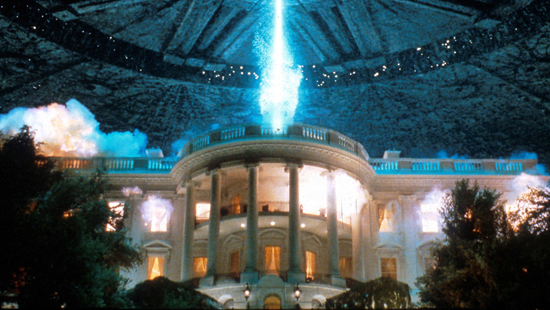
“And should we win the day, the Fourth of July will no longer be known as an American holiday, but as the day the world declared in one voice: ‘We will not go quietly into the night!’ We will not vanish without a fight! We’re going to live on! We’re going to survive! Today we celebrate our Independence Day!”